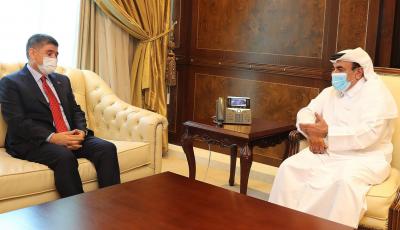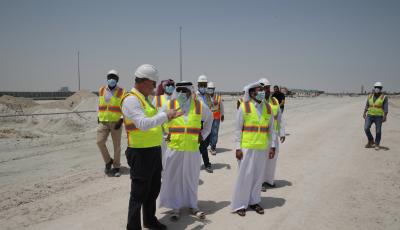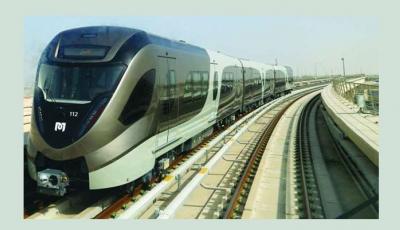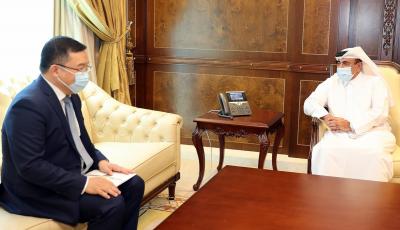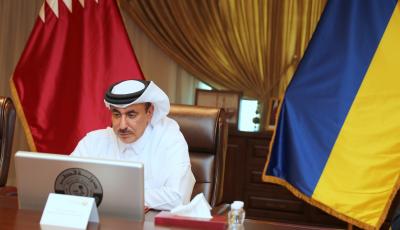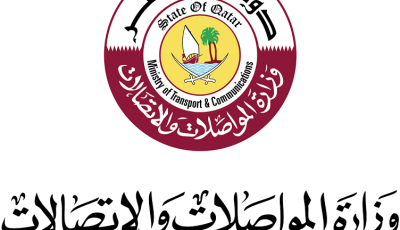Thursday, August 20, 2020
Minister Al-Sulaiti, Ukraine Infrastructure Minister Witness Initialing of S.C. Olvia Port Concession Agreement
Doha – KievHE the Minister of Transport and Communications Jassim Saif Ahmed Al-Sulaiti and HE the Ukrainian Minister of Infrastructure Mr. Vladyslav Kryklii have witnessed the initialing of the concession agreement for the development and operation of the S.C. Olvia Port - Ukraine, between QTerminals Qatar, QTerminals S.C. Olvia, the Ministry of Infrastructure of Ukraine, and the State Enterprise Ukrainian Sea Ports Authority (USPA), at a virtual signing ceremony in Doha and Kiev via videoconferencing. The event was attended by Chairman of Qatar Navigation (Milaha) HE Sheikh Jassim bin Hamad bin Jassim Al Thani, Qatar’s Ambassador to Ukraine HE Mr. Hadi bin Nasser Al-Hajri and Ukraine’s Ambassador to Qatar HE Mr. Andrii Kuzmenko.The agreement was initialed by QTerminals Qatar CEO Mr. Neville Bissett, QTerminals SC Olvia Executive Director Mr. Mohammed Al Lahham, Ukrainian State Secretary of the Ministry of Infrastructure HE Mr. Buchko Volodymyr Anatoliiovych, and Acting Head of SE USPA HE Mr. Holodnytskyi Oleksandr Hryhorovych.The term of the concession is 35 years, until 2056, during which QTerminals will invest about $140 million to develop the port over the next five years provided that $3.5 million out of that amount is allocated for the restoration of local infrastructure of Mykolaiv, the city where the port is located.Additionally, during the first five years of the concession, QTerminals will invest in establishing a new fully-equipped grain terminal, improve existing warehouses, modernize the road and telecommunications networks and all Olvia utilities and buildings, and set up silos and loading equipment for all modes of transportation, such as railway and freight lines.Commenting on the occasion, HE Minister Al-Sulaiti stressed the strong relations between the State of Qatar and the Republic of Ukraine and the high level of bilateral cooperation between the two friendly countries.“This concession is a major achievement for QTerminals that honors its strategy for expanding overseas investments as a Qatari company specialized in seaport management,” he said.He noted that awarding the concession is a significant investment opportunity in one of Ukraine’s most important Black Sea ports and that all development works that QTerminals will carry out at the Port of Olvia will contribute to supporting its operations and relevant navigational and logistics services to meet the highest world standards in such a way that will enhance its operational revenues and provide every opportunity for the port to succeed in becoming an international hub for the grain trade.HE the Minister also said that this step will bolster the economic cooperation with Ukrainian and international companies and contribute to supporting the operations of the maritime line between Ukrainian ports and Hamad Port, thus supporting the goals of the Qatar National Vision 2030.This investment, he noted, will represent a turning point in QTerminals’ contributions to the sustainability of the national economy and the support for efforts to leverage Qatar’s competitiveness on the world map.HE Minister Kryklii said that re-profiling the infrastructure in the region and developing it in such a way that responds to our aspirations and ambitions will give considerable impetus to the development of the region at large.For the Ukraine, the agreement signed with QTerminals is another significant step on the way on widening and re-unlocking the potential of the Port of Olvia, as the company will pay concessions and other fees to the country annually, in addition to QTerminals creating hundreds of new jobs needed by the local community in the city of Mykolaiv.Mr. Bissett said that this agreement is “the first brick in our strategy of international expansion. We have the power, determination, desire and experience to strengthen cooperation between Qatar and Ukraine in the sphere of port production in the Black Sea basin, and we look forward to achieving this in a short period of time.”“We are firmly convinced and confident that the strong management of QTerminals, together with capabilities and expertise of Ukrainian ports will lead to fruitful results and a reality that is built on all factors of success, which we all look forward to,” he added.Established in 1992, S.C. Olvia Port - Ukraine, located in the Mykolaiv region on the Black Sea coast, has been seeing a significant year-on-year increase in grain and oil exports. Mykolaiv is a city in southern Ukraine and one of the region’s principal shipbuilding centers. On an area of 140 hectares, SC Olvia Port has 7 berths and a rail network for transporting cargo inside the port, in addition to several warehouses and storage areas. Its quayside is 1530 meters long.QTerminals was established as a joint venture between the Qatar Ports Management Company (Mwani Qatar) and shipping and logistics company Qatar Navigation (Milaha). QTerminals operates Phase 1 of Hamad Port and is currently working on building Phase 2 of the port. Hamad Port has played a key role in making Qatar a regional business hub that boosts tradein the Middle East region as well as the region’s trade with the rest of the world.
